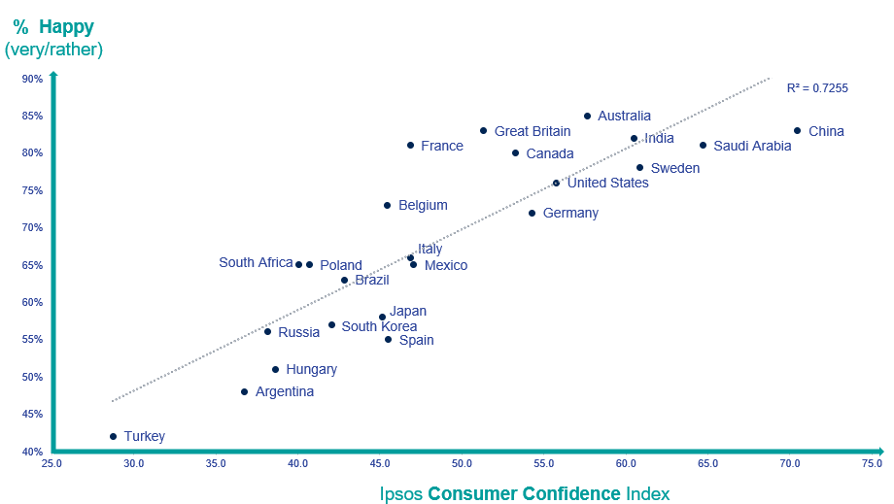What makes people happiest: Health, family, and purpose
A new Ipsos survey finds that, on average across 30 countries, two in three adults (67%) consider themselves “happy.” Among the countries surveyed, happiness is most prevalent in the Netherlands and Australia, with 86% and 85% respectively describing themselves as “very” or “rather” happy. China and Great Britain (both 83%), India (82%), France and Saudi Arabia (both 81%), and Canada (80%) follow.
At a global average level, the prevalence of happiness globally is now not only higher than it was in mid-2020, a few months into the COVID-19 pandemic, but also compared to mid-2019, months before the pandemic. However, it is 10 points lower than it was 10 years earlier, back in late 2011.
The survey finds that, across the world, people most look to their health and well-being (both physical and mental), their family (partner/spouse and children), and having a sense of purpose as what gives them “the greatest happiness.” Next come their living conditions, feeling safe and in control, being in nature, having a meaningful job, and having more money.
Some elements are more widely viewed as sources of happiness today than they were back in 2019, pre-pandemic. Drivers of happiness that have most gained in importance are “being forgiven”, “forgiving someone”, finding someone to be with” and, although only a minority of adults mention it as a source of any happiness, “spending time on social media”.
These are some of the findings of a survey of 20,504 adults under the age of 75 conducted between November 19 and December 3, 2021, on Ipsos’s Global Advisor online survey platform.
Where Are People Happier?
The happiest countries surveyed, i.e., those where more than three out of four adults report being very happy or rather happy are the Netherlands, Australia, China, Great Britain, India, Saudi Arabia, France, Canada, Sweden, and the United States. Only two countries show fewer than one in two adults saying they are happy: Argentina and Turkey.
On average across 30 countries, 15% report being very much so and 52% rather happy. Countries with the highest proportion of adults considering themselves as very happy are India (39%), Australia (30%), and Saudi Arabia (29%). Those with the highest prevalence of adults saying they are not happy at all are Turkey (18%), Argentina (14%), and Hungary (13%).
Changes in Happiness Levels
Averaging at 67% across the 30 countries, the prevalence of happiness is four percentage points higher than in July-August 2020 and three points higher than in May-June 2019. However, it has a long way to go to regain its level of 77% recorded both in November-December 2011 and in April-May 2013.
- Compared to mid-2020, the proportion of happy adults has increased by five percentage points or more in 11 countries, particularly in Peru (+22), Mexico (+19), Chile (+18), and Spain (+17) while it is down by five points or more in only two countries, Turkey (-17) and China (-10).
- Compared to mid-2019, it is up by five points or more in nine countries (most of all in Argentina and Malaysia)) and down by five points or more in four countries (Canada, Germany, Poland, and Turkey).
- Compared to 10 years earlier, it is down in most countries, but nowhere as much as in Turkey (-47) and, despite a notable uptick in the past two years, in Argentina (-20).
Sources of Happiness in the COVID Era
Among 31 potential sources of happiness, people across the world are most likely to say they derive “the greatest happiness” from:
- My physical health and well-being (cited by 54%)
- My mental health and well-being (cited by 53%)
- My relationship with their partner/spouse (49%)
- Feeling my life has meaning (49%)
- My children (48%)
- My living conditions (47%)
- My personal safety and security (46%)
- Feeling in control of my life (44%)
- Being in nature (43%)
- Having a meaningful job/employment (42%)
- Having more money (42%)
Each of these 11 sources ranks in the top 11 of most countries. However, some other sources of happiness stand out as being particularly important in just one or a handful of countries (where they make the top 5):
- My personal financial situation (France)
- My hobbies/interests (Japan)
- The amount of free time I have (Japan, South Korea)
- Finding someone to be with (China, Germany, Japan, and Russia)
- Being recognized as a successful person (India and Turkey)
- My spiritual or religious well-being (Malaysia and Saudi Arabia)
- The state of the economy (South Korea)
Compared to the last survey conducted before the pandemic (May-June 2019), the sources of happiness that have most gained in importance globally pertain to personal connections and spirituality:
- Being forgiven for something I did (+8 points)
- Finding someone to be with (+7)
- Forgiving someone for something they did (+6)
- Time spent on social media (+6)
- My religious or spiritual well-being (+5)
The following sources of happiness have also gained in importance over the last 10 years:
- Moving to another country (+10)
- My access to entertainment or sports (+6)
- Freedom to express my beliefs (+6)
- The amount of free time I have (+5)
Happiness and Consumer Confidence
One of the main findings of the survey is the strong relationship between self-reported happiness and consumer confidence. Ipsos found a remarkably high level of correlation between the percentage of adults surveyed saying they are very or rather happy and the Ipsos Consumer Confidence Index in the same 23 countries – a coefficient of 0.73. The Consumer Confidence Index reflects consumers’ sentiment about their financial situation and purchasing comfort, the economy, jobs, and investment.

These are the findings of a 30-country Ipsos survey conducted November 19 – December 3, 2021, among 20,504 adults aged 18-74 in the United States, Canada, Malaysia, South Africa, and Turkey, 21-74 in Singapore, and 16-74 in 24 other countries, via Ipsos’s Global Advisor online survey platform.



